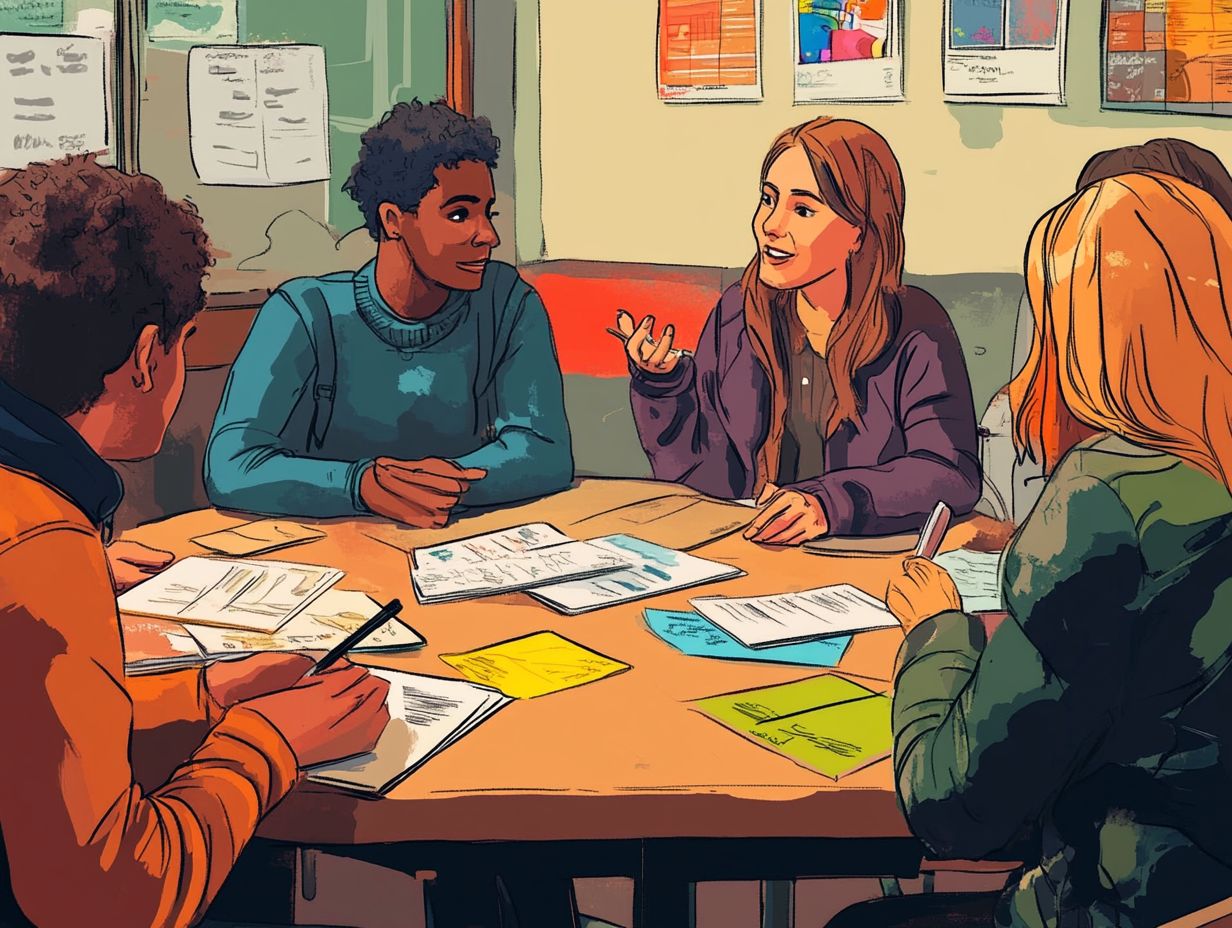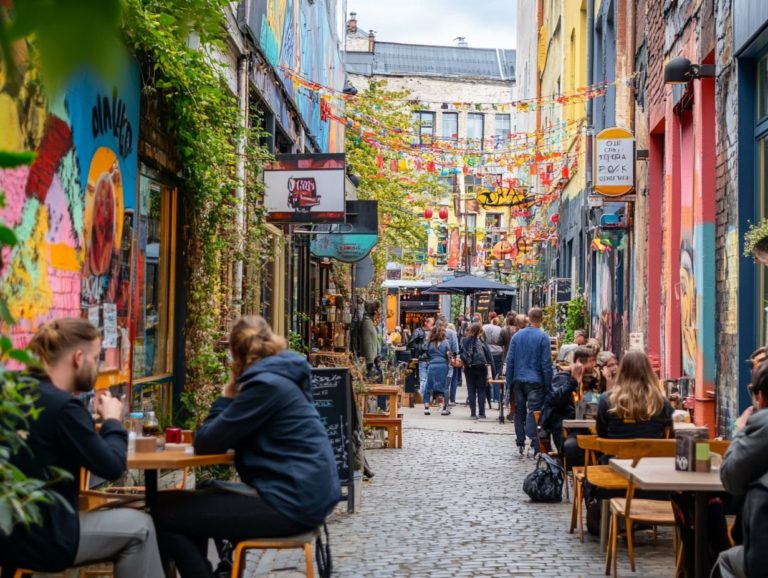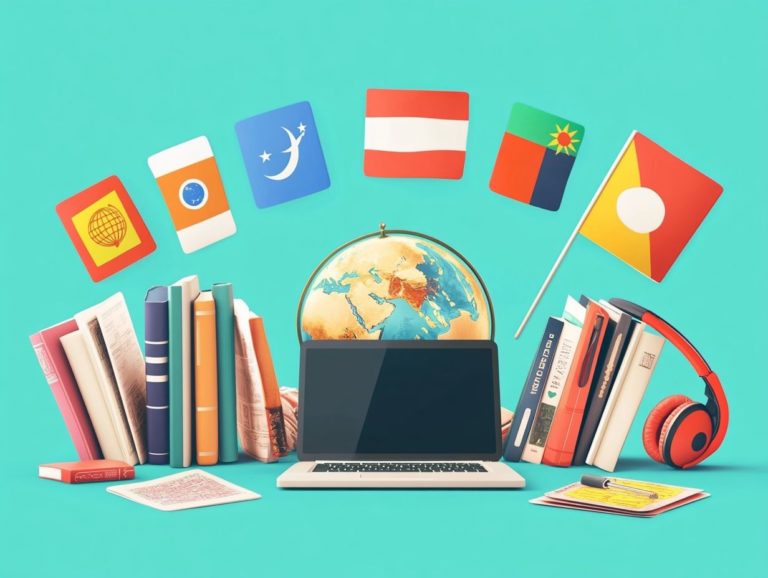tips for immersing yourself in a new language
Language immersion represents an enriching experience that transcends traditional classroom learning, presenting a vibrant opportunity for you to master a new language while connecting with its culture.
This discussion will delve into the myriad benefits of immersing yourself in a new language. We will highlight enhanced language skills and a deeper cultural understanding.
Additionally, we will offer practical advice on how to prepare for this transformative journey, along with effective learning techniques and strategies to navigate common challenges.
Whether you re just starting out or seeking to refine your existing skills, get ready to dive into this guide and boost your language skills!
Contents
- Key Takeaways:
- Benefits of Immersing Yourself in a New Language
- How to Prepare for Language Immersion
- Practical Tips for Immersing Yourself in a New Language
- Overcoming Challenges in Language Immersion
- Frequently Asked Questions
- How can I effectively immerse myself in a new language?
- Is it important to practice speaking in the new language?
- How can I make language learning more fun and engaging?
- Are there any specific activities I can do to immerse myself in a new language?
- How can I stay motivated when learning a new language?
- Is it okay to take breaks while learning a new language?
Key Takeaways:

- Immerse yourself in the language by practicing with native speakers and using immersive learning techniques.
- Choose a language and location that interests you, and set realistic goals for your language immersion journey.
- Overcome challenges such as frustration and homesickness by embracing the language and culture. Seek help when needed.
What is Language Immersion?
Language immersion stands as one of the most effective educational approaches. It allows you to acquire a new language within a natural context. By engaging with native speakers and immersing yourself in the culture, you ll find yourself using the target language in everyday situations.
This method envelops you in a rich linguistic environment where your skills in speaking, listening, reading, and writing can flourish, all while deepening your cultural understanding.
Immersion transcends traditional classroom activities; it encompasses real-world experiences like travel and conversation clubs, enriching your connection to the language.
Through immersive learning techniques, think and respond in the target language, streamlining the thinking skills needed to learn.
Cultural adaptation becomes an essential component, enabling you to grasp nuances that textbooks simply can t convey.
Engaging in practical activities like cooking classes or community service projects provides hands-on experiences that connect linguistic theory to actual use.
Whether you re participating in guided tours in a foreign city or collaborating on projects with local speakers, these experiences enhance your language skills and cultivate a profound appreciation for diverse cultures, fostering personal growth and intercultural competence.
Benefits of Immersing Yourself in a New Language
Immersing yourself in a new language unlocks a wealth of benefits that extend far beyond simply adding new words to your repertoire. It enriches your language skills, deepens your cultural understanding, and promotes self-development elements vital in our interconnected world today.
Many learners find this journey boosts their retention and enhances grammar proficiency. Ongoing practice fosters active engagement and authentic conversations through conversation clubs, podcasts, or audiobooks.
Immersion helps you navigate different cultures, emphasizing the importance of context in fostering meaningful interactions.
Improving Language Skills
Improving your language skills through immersion necessitates consistent practice and engagement with a variety of exercises aimed at enhancing your speaking, listening, reading, and writing competencies.
By embracing interactive learning techniques, you can receive immediate feedback that allows you to correct mistakes and reinforce grammar rules.
This holistic approach accelerates your fluency and nurtures your creativity in using the language in diverse contexts, whether in conversation clubs or everyday interactions.
Incorporating tasks like role-playing or storytelling into your practice sessions provides essential opportunities for you to experiment and refine your skills.
Digital platforms and mobile applications offer interactive lessons and quizzes, making vocabulary acquisition both enjoyable and engaging.
Collaborative tools allow for peer-to-peer feedback, fostering a supportive learning environment where you can share insights and challenge one another.
Ultimately, embracing a variety of methodologies enriches your learning experience and builds your confidence, enabling you to communicate more effectively across different settings.
Start your language immersion journey today!
Cultural Understanding and Adaptation
Cultural understanding and adaptation are crucial elements of your language immersion journey. They allow you to connect deeply with the societal norms and values that shape the target language. By engaging with a variety of subjects like local history, art, and traditions you ll gain insights that enhance your appreciation of diverse cultures.
Travel opportunities create immersive environments that foster authentic interactions. This enables you to apply your language skills in real-world contexts.
When you embrace the nuances of a culture, you enhance your language skills and cultivate a more empathetic and open-minded approach to travel. Exploring local customs will help you connect with native speakers, making it easier to practice your language skills in everyday situations.
Participating in community events, cooking classes, or guided tours can offer invaluable learning experiences. Meanwhile, various online resources like language exchange programs and cultural podcasts provide additional support.
Understanding local manners and social signals will make your travel more enjoyable and open the door to lifelong connections.
How to Prepare for Language Immersion

Preparing for language immersion demands careful planning. Selecting the right language and location can profoundly shape your learning experience and outcomes.
Choosing the right language can make your journey exciting and meaningful! Align your chosen language whether it s French, Spanish, German, or Italian with your personal interests and future aspirations. This alignment ensures a motivated and engaging learning journey.
Establishing realistic goals is important for keeping you focused. This allows you to track your progress effectively. You can make adjustments to your educational tools and resources, such as online courses or language exchanges, to enhance your experience further.
Choosing a Language and Location
Choosing the right language and location for your immersion experience is an important step that can greatly enhance your learning journey. It s essential that this choice aligns with your interests and future aspirations.
Whether you learn French in the charming streets of Paris or immerse yourself in Spanish in vibrant Barcelona, the location should offer ample opportunities for real-world practice and cultural exploration. This alignment boosts your motivation and deepens your understanding of the language’s context and practical usage.
Beyond personal interest, practical outcomes must also be at the forefront of your decision-making. Certain regions may have stronger job markets or educational programs in specific languages, making them more beneficial for your professional growth.
The local community’s engagement with the language can significantly impact your ability to practice conversational skills. Therefore, research whether your chosen destination offers a wealth of cultural interactions, events, or classes that align with your learning goals.
Find where your passions meet practical benefits, and get ready for an amazing language adventure!
Setting Realistic Goals
Setting realistic goals is crucial for maintaining motivation and effectively tracking your progress throughout your language immersion journey. It provides a clear framework for what you want to achieve.
Enhancing your experience becomes easier when you identify specific skills to focus on, such as listening comprehension or spoken interaction both important for developing fluency. Regularly reviewing these objectives will keep you on track and instill a sense of accomplishment as you reach each milestone.
Incorporating a variety of activities like watching films in your target language or engaging in conversations with native speakers can significantly enrich your learning process.
Additionally, integrating feedback mechanisms allows you to adjust your strategies. This fosters a sense of ownership over your journey and encourages continuous improvement.
Practical Tips for Immersing Yourself in a New Language
To fully immerse yourself in a new language, consider tips to enhance your language immersion experience that elevate your learning. These methods can fast-track your fluency and cultural understanding.
Engaging in language exchanges, utilizing educational tools such as audiobooks and podcasts, and participating in conversation clubs can create a supportive environment for honing your language skills.
Incorporating daily exercises that match your interests will enhance retention and significantly boost your confidence in real-life conversations.
Immersive Learning Techniques
Immersive learning techniques encompass a range of methods that help you learn by using the language in real life.
Resources like podcasts and audiobooks are essential to this journey. Podcasts are audio shows that you can listen to on various topics and offer a captivating way to immerse yourself in a new language. This transforms the learning process from a tedious task into an enriching experience.
By diving into podcasts, you can listen to conversations, interviews, and stories that mirror everyday usage. Audiobooks present structured narratives that broaden your vocabulary and comprehension.
Incorporating interactive resources, such as language-learning apps that embrace gamification or chatbots, allows you to practice speaking and listening in a supportive environment.
This blend of traditional and modern tools deepens your connection to the language and elevates your overall learning journey.
Practicing with Native Speakers

Practicing with native speakers is one of the most effective methods for enhancing your language skills. It provides authentic exposure to conversational nuances and cultural insights.
Engaging in language exchanges or participating in conversation clubs boosts your fluency and builds your confidence in speaking and listening. These interactions allow you to explore everyday vocabulary and grammar in context.
To uncover such opportunities, consider exploring local meetups, online platforms, or social media groups dedicated to language learners. Websites and apps like Tandem and HelloTalk are excellent resources that connect you with native speakers eager to practice.
By scheduling regular video calls or face-to-face meetups with a language partner, you ensure consistent practice. Through meaningful conversations, asking questions, and sharing cultural stories, you can enhance your language proficiency. You ll also cultivate lasting friendships that broaden your understanding of diverse perspectives.
Overcoming Challenges in Language Immersion
Overcoming challenges in language immersion is a crucial part of your learning journey. You may encounter frustrations, homesickness, and language barriers that could impede your progress.
Recognizing that mistakes are a natural component of the learning process empowers you to navigate these obstacles. Instead of succumbing to discouragement, embrace errors as valuable opportunities for growth.
It’s important to adopt methods that help you cope with these challenges. Doing so ensures a successful and enriching immersion experience.
Coping with Frustration and Homesickness
Coping with frustration and homesickness during language immersion is essential for maintaining motivation. It ensures a rewarding learning experience.
Incorporate specific techniques like mindfulness or journaling to create a safe space for processing your emotions effectively.
Seeking out local community groups or language exchange partners fosters a sense of belonging, helping you bridge the gap between familiar comforts and new experiences.
Setting achievable goals in your language learning journey cultivates a sense of accomplishment. Regular video calls with family and friends offer the emotional support you might need.
Balancing these strategies strengthens your resilience and enriches your overall immersion experience, transforming it into a meaningful phase of personal development.
Dealing with Language Barriers
Navigating language barriers is a common challenge during immersion. However, with effective techniques and proactive communication strategies, you can overcome these hurdles and communicate better. Using simple language, incorporating gestures, or actively seeking clarification will enhance your confidence and fluency.
Regular conversations with native speakers empower you to navigate and diminish these obstacles effectively. Embracing technology, such as language exchange apps or translation tools, can truly transform your learning experience!
Shadowing native speakers or participating in language meetups fosters organic learning. This approach allows you to adapt to colloquial expressions and various accents. Maintaining a positive mindset is essential; having patience and resilience will greatly help when tackling misunderstandings.
By consistently applying these strategies, you ll not only improve your interactive skills but also foster more meaningful connections. This ultimately enriches your language acquisition journey.
Frequently Asked Questions
-
How can I effectively immerse myself in a new language?
To effectively immerse yourself in a new language, surround yourself with the language as much as possible. This can include listening to music and podcasts, watching movies and TV shows, and reading books and articles. Finding a language exchange partner or enrolling in a language course can also be beneficial.
-
Is it important to practice speaking in the new language?
Yes, practicing speaking in the new language is crucial for immersion. It helps improve your pronunciation, vocabulary, and grammar. Don’t be afraid to make mistakes; they are a natural part of the learning process.
-
How can I make language learning more fun and engaging?
Incorporate language learning into your hobbies and interests. For example, if you enjoy cooking, try following recipes in the new language. Additionally, use language learning apps and games or join online communities of learners to practice with.
-
Are there any specific activities I can do to immerse myself in a new language?
There are many activities to immerse yourself in a new language. Join a language club or meetup, participate in language exchange events, attend cultural festivals, or travel to a country where the language is spoken.
-
How can I stay motivated when learning a new language?
To stay motivated, set achievable goals and track your progress. Find a study routine that works for you and mix up your learning activities to keep things interesting. Celebrate your progress and remember not to be too hard on yourself if you make mistakes.
-
Is it okay to take breaks while learning a new language?
Yes, taking breaks is important for maintaining motivation and avoiding burnout. Just try not to take too many breaks in a row and stay consistent with your learning. Having a specific end goal, like traveling to a country where the language is spoken, can keep you motivated.
Start practicing today!







